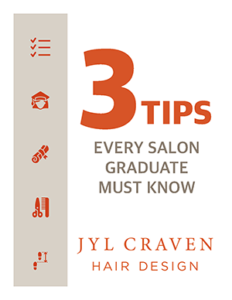Ask almost any mother and you’ll hear stories of a child born with fine straight hair who, as an adult, now sports a head full of thick natural curls (or vice versa.) And of course, most of us are all too familiar with the way hair’s texture and color changes as we age. What’s behind the way our hair changes as we age from child to teen to adult to senior citizen?
Our hair actually changes every five to seven years, and much of those changes have to do with hormones. Let’s take a look at the science behind how hair changes early and late in life and how to care for hair as we grow.
Childhood
 A newborn’s hair is often described as “baby-fine” and for good reason. Young children often have fine, delicate hair. Use a very gentle “baby shampoo” on babies, because they need an oilier shampoo (we adults produce more natural oils and tend to use conditioner and other moisturizing treatments). Switch to a frequent-use shampoo on toddlers and grade school aged children. A wash every other day is generally sufficient.
A newborn’s hair is often described as “baby-fine” and for good reason. Young children often have fine, delicate hair. Use a very gentle “baby shampoo” on babies, because they need an oilier shampoo (we adults produce more natural oils and tend to use conditioner and other moisturizing treatments). Switch to a frequent-use shampoo on toddlers and grade school aged children. A wash every other day is generally sufficient.
Also, use a wide-toothed comb or a boar-bristle or paddle brush on children. Vent brushes can snag on tangled hair and create an early aversion to routine hair care in your child!
Does your child have a cowlick? Tame it by allowing the hair to grow longer or using styling gel. Or, you can also work with what you have and use that gel to spike the rest of the hair up to match the cowlick!
The Golden Years
By the time hair begins to gray, the human body has gone through several major hormonal changes, and the texture of the hair may be entirely different than the texture of your hair as a child. These changes can manifest in hair thinning, graying and general dullness.
Diet and proper color can go a long way toward maintaining a youthful look.
Iron, protein and Vitamin B deficiencies can translate into unhealthy locks. Be sure to eat plenty of protein and take supplements if you find yourself deficient in iron or Vitamin B. Of course, consult with your physician first. As for protein, duck eggs are a great source and they are high in the vitamin biotin, which promotes stronger hair.
Bonus: Does stress really turn hair gray?
 Scientists argue among themselves whether stress really causes gray hair. But science has found that stressors like health, thyroid problems, lack of adequate nutrition, can cause premature grayness. Smoking is also a known cause of graying. Perhaps stress from health issues and the stress that caused someone to start smoking in the first place is correlated with graying. For now, there’s no conclusive scientific proof that stress automatically equals gray locks.
Scientists argue among themselves whether stress really causes gray hair. But science has found that stressors like health, thyroid problems, lack of adequate nutrition, can cause premature grayness. Smoking is also a known cause of graying. Perhaps stress from health issues and the stress that caused someone to start smoking in the first place is correlated with graying. For now, there’s no conclusive scientific proof that stress automatically equals gray locks.
Now matter what stage of life you find yourself in, a trained stylist will be able to help you determine the best way to care for your hair – or your child or grandchild’s hair – at any age.




